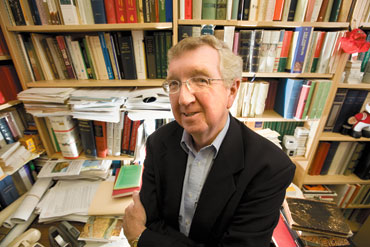Professor finds the modern in the medieval
Chris Kleinhenz has spent most of his academic career in hell, and he couldn’t be happier about it.

Chris Kleinhenz retired from the Department of French and Italian after nearly 40 years of leading students through Dante’s “Divine Comedy” — including Inferno, Purgatory and Paradise — and showing them why the medieval text matters.
He just retired from the Department of French and Italian after nearly 40 years of leading students through Dante’s “Divine Comedy” — including Inferno, Purgatory and Paradise — and showing them why the medieval text matters.
Kleinhenz has also contributed to the major growth in the teaching of Italian as a second language in the United States and pushed for parity with Spanish, French and German in American education — all the better to read Dante with.
“It is a challenge to teach Dante because you’re dealing with an author who wrote almost 700 years ago in a completely different situation, but one which, I think, has a lot of connections, a lot of parallels with the age in which we live,” says Kleinhenz, who served as editor of the international journal “Dante Studies” for 15 years.
“I admit being defeated by [hell] because I usually spend so much time in the Inferno that by the time I get to Paradise, I have maybe two weeks or so to do it, even though I may have planned for a month in the syllabus.”
Chris Kleinhenz
Kleinhenz, who directed the College of Letters and Science Honors Program for the past two years and is one of the founders of the Medieval Studies Program, has taught everything from elementary language to graduate seminars.
“One of the great things about our department is we’ve made no rigid distinction between people who teach literature and people who teach language,” he says. “Those departments where faculty are involved in all levels of instruction provide a valuable model for graduate students who can see firsthand what it means to be in the profession. … You can’t just divorce yourself from language teaching.”
In English or Italian, hooking students into Dante’s journey through the afterlife and his exploration of the operation of divine justice isn’t the easiest of tasks for a teacher. But the award-winning professor — consistently ranked as a favorite by students and a recipient of the Chancellor’s Award for Distinguished Teaching in 2004 — found ways to draw those lines, as he repeatedly reread his copy of the “Comedy,” heavily annotated in pencil. Kleinhenz likens Dante’s exile from his home city of Florence to the plight of the protagonist in Tom Hanks movie “Terminal,” who is stateless and without citizenship, and quotes Michael Douglas’ “Greed is good” soliloquy from “Wall Street” to illustrate that the perils of Dante’s time weren’t much different from ours.
“Today, when we’re faced with ethical questions posed by the Enron debacle and with problems of corruption in government … we should realize that these could also be called watchwords for Dante’s age, because he was living in a society in which consumerism was running rampant, in which traditional values were not respected,” he says.
But Kleinhenz says that Dante’s world view and his vast knowledge in a number of areas sometimes threaten to get in the way of students being willing or able to absorb his work.
“I always tell my classes, ‘What I’m telling you was current in Dante’s age. And so when I tell you the Earth is the center of the universe, you have to believe me, even though we know that the universe has no real center,’” he says.
Dante can also be tough for students to tackle because the poet expects his readers to be familiar with the Bible, classical and medieval literature and history, mythology, science, art, music, philosophy and theology. Much of the beauty of the “Comedy” may be found in how the poet synthesizes these various, disparate elements into a coherent whole, Kleinhenz says.
“Dante’s poem is essentially an encyclopedia,” he says. “It’s all there; it’s a representation of a perfectly ordered universe.”
Another challenge of teaching Dante has been getting students interested in Purgatory and Paradise, Kleinhenz says, recalling “the wonderful line” in the movie “Animal House” from the professor played by Donald Sutherland who tells his class that Satan is the most intriguing character in Milton’s “Paradise Lost” precisely because evil is always more interesting than goodness.
Kleinhenz says he has even found himself getting caught up in hell during the semester-long course that covers the entire “Divine Comedy” in English.
Kleinhenz has done his part to make sure more students will be able to read Dante in its original language. He’s worked closely with the nonprofit group WisItalia to promote the teaching of Italian in Wisconsin high schools, an effort that’s paid off with courses established in schools in Madison, Milwaukee, Kenosha and elsewhere.
As president of the American Association of Teachers of Italian, he also collaborated with colleagues around the country to write a successful proposal to create an advanced placement Italian program with the College Board, so high school students can take the AP test for college credit.
“Now there’s a whole queue of other languages waiting for approval — Chinese and Japanese, Russian, Arabic and so on, and I think that’s wonderful,” he says.
And while he has taught “The Divine Comedy” in both English and Italian, Kleinhenz believes there’s no contest as to which students have the richer experience.
“Students don’t have any sense of the sound, the nuances of the language, the musicality, if you will, of the verse, the serious games that Dante is playing with language,” he says. “They can’t really savor the sort of aesthetic beauty of the text itself if they have to read it through the medium of English.”




